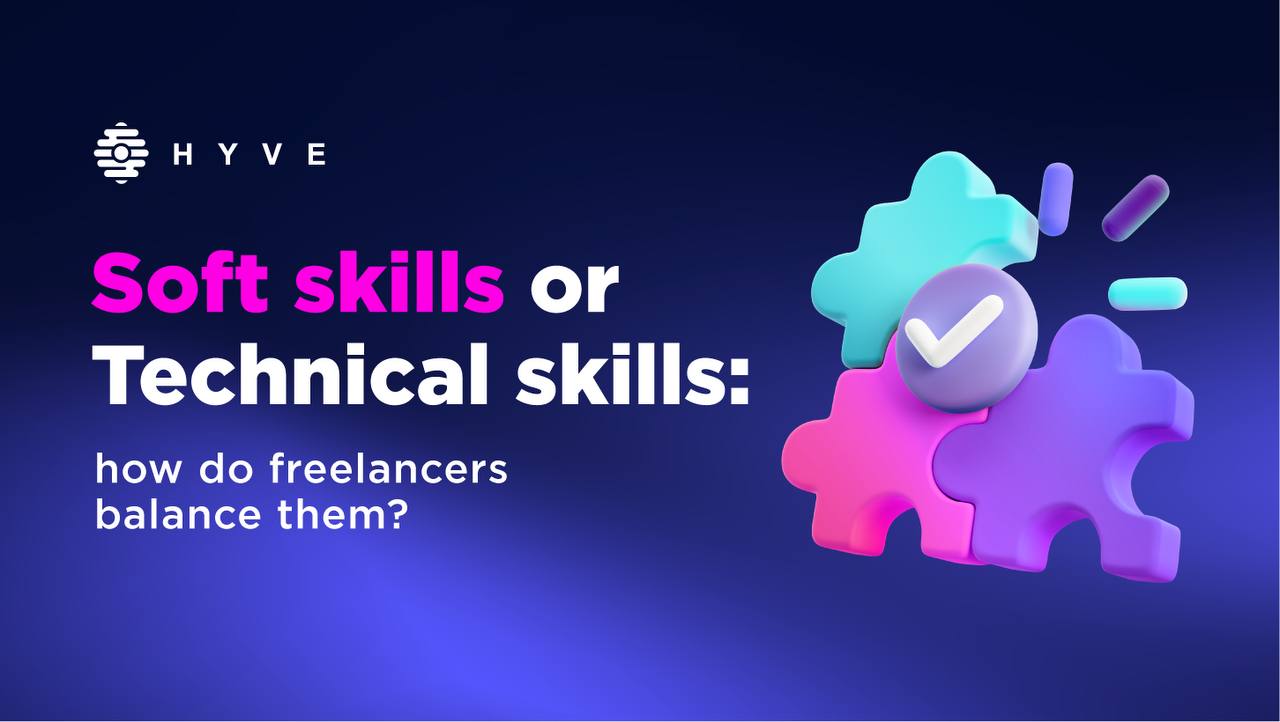The Perfect Balance: How freelancers switch between soft and technical skills

In today's ever-evolving job market, freelancers play a crucial role in meeting the diverse needs of businesses across the globe. However, succeeding as a freelancer goes beyond possessing technical expertise alone.
To truly thrive in this competitive landscape, freelancers must strike the perfect balance between their soft skills and technical abilities. As HYVE has already accustomed you, today we will explore the importance of finding an equilibrium between these two skill sets and provide examples of how you can enhance your freelancer success story.
Some examples of abilities you might have and don't know yet...
- The Power of Soft Skills - soft skills, also known as interpersonal or people skills, are personal attributes that enable effective communication, collaboration, and problem-solving. They are essential for building strong relationships with clients and fostering a positive work environment. Let's delve into a few examples of impactful soft skills:
- Communication - effective communication is the cornerstone of successful freelancing. Freelancers who can clearly articulate their ideas, actively listen to client's needs, and adapt their communication style to different stakeholders are more likely to exceed expectations. Strong communication skills not only foster trust but also help freelancers navigate challenges and deliver outstanding results.
- Time Management - freelancers juggle multiple projects simultaneously, making time management a critical soft skill. The ability to prioritize tasks, set realistic deadlines, and maintain a disciplined work routine ensures that projects are delivered on time. Punctuality instills confidence in clients and establishes a reputation for reliability, leading to repeat business and positive referrals.
- Adaptability - In an ever-changing work environment, adaptability is invaluable. Freelancers who can swiftly adjust to new technologies, emerging trends, and client preferences are more likely to remain competitive —demonstrating a willingness to learn and adapt positions freelancers as valuable assets to clients seeking innovative solutions and fresh perspectives.
- The Significance of Technical Skills - While soft skills provide a solid foundation, freelancers must also possess the technical expertise to deliver high-quality work. Technical skills refer to the specific knowledge, tools, and techniques required to perform a particular job.

Let's explore a few examples of crucial technical skills...
a. Web Development - in the digital age, web development skills are in high demand. Freelancers with proficiency in coding languages like HTML, CSS, and JavaScript can create visually appealing and user-friendly websites. The ability to troubleshoot, optimize performance, and stay updated with the latest industry standards ensures the delivery of exceptional web solutions.
b. Graphic Design - visual communication is a powerful tool, and freelancers with graphic design skills can transform ideas into captivating visuals. Proficiency in design software like Adobe Photoshop and Illustrator enables freelancers to create stunning logos, branding materials, and marketing collateral. Technical expertise in graphic design complements freelancers' creativity, enhancing their ability to deliver compelling visual narratives.
c. Digital Marketing - with the rise of online businesses, digital marketing skills have become indispensable. Freelancers well-versed in search engine optimization (SEO), social media marketing, and content creation can help clients reach their target audience effectively. The technical knowledge required to analyze data, optimize campaigns, and generate meaningful insights allows freelancers to drive tangible results and maximize clients' return on investment.

The most successful freelancers are those who harmoniously blend their soft skills with their technical prowess. The ability to leverage both skill sets enhances their professional reputation, attracts more clients, and leads to long-term success. Here are a few examples of how the balance between soft and technical skills can lead to excellence:
a. Problem-Solving - a freelancer who possesses strong communication skills (soft skills) and technical expertise in web development (technical skills) can effectively understand client requirements, propose creative solutions, and implement them seamlessly.
b. Client Management - combining excellent time management (soft skill) with digital marketing knowledge (technical skill) enables freelancers to set realistic expectations, meet deadlines, and provide insightful recommendations to clients, ensuring client satisfaction and fostering long-term partnerships.
c. Collaboration - a freelancer skilled in adaptability (soft skill) and graphic design (technical skill) can seamlessly integrate into diverse teams, contribute unique perspectives, and create visually cohesive deliverables that align with clients' brand identities.

Freelancing success hinges on finding the perfect balance between soft skills and technical expertise. While technical skills provide the foundation for delivering exceptional work, soft skills enable effective communication, collaboration, and adaptability. By mastering this delicate balance, freelancers can elevate their professional reputation, attract more clients, and foster long-term success. So, embrace the power of both soft and technical skills, and unlock the full potential of your freelancing journey!
HYVE has been your #1 supporter for your freelancing work since you started on this path and so were you for us, as this journey would not have taken place without you guys! Hard work or dedication might be our new middle name as we have a lot of surprises in store for our determined HYVERS. Stay tuned for more and keep an eye on our Twitter for daily updates!
